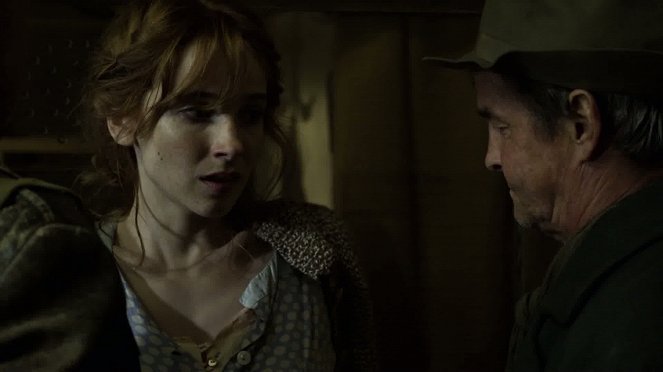Regie:
Jiří ChlumskýDrehbuch:
Josef UrbanMusik:
Boris UrbánekBesetzung:
Ondřej Vetchý, Vica Kerekes, Attila Mokos, Igor Bareš, Anna Šišková, Jarek Hylebrant, Jiří Schmitzer, Norbert Lichý, Fyodor Bondarchuk (mehr)Streaming (1)
Inhalte(1)
This story actually happened in the region around the city of Sumperk in Jeseniky Mountains in May 1945. The disappearance of Agnes, the German wife of a Czech forester Jan Olsan is a dark mystery. She is the only one who knows who and for what reason is looking for her. It's the end of the war, times are bad and the Czechs are coming back from the inland to the frontier. The guards are forming and soldiers are coming. Fate brings together the outlaw Jan and his German brother-in-law Jurgen who has just returned from the eastern front line. Both men are looking for exactly the same woman and that is Agnes. But Agnes escaped; she is running away through the deep woods followed by the most powerful man of the county. Running away for what she had witnessed. The fatality of the relationship between Agnes and Jan can only be learned in the mountains on this thorny journey... (Verleiher-Text)
(mehr)Kritiken (4)
I am terribly happy for any film that shatters the conventional view of the brutal post-war purge of the Sudetenland, but why is it done in such an uninteresting way as in this case? This is a rudimentary fable in which the characters utter unnatural and screwed-up dialogue (I had the same problem with Habermann's Mill, and lo and behold, the same screenwriter!), and Ondřej Vetchý's character and his German wife spend the vast majority of the runtime fleeing the wrath of the Revolutionary Guards, from place to place, over and over again, until the film becomes monotonous and tiresome. The icing on the cake is the unintentionally funny ending, which slips into self-parody. There aren’t many films about post-war displacement, but comparisons can still be made, and both Adelheid and the problematic Habermann's Mill are of much greater narrative and emotional value. I feel sorry for Ondřej Vetchý, who played his role with dignity and passion, unfortunately, in a bad film.
()
The Central Europe is riding on the wave of self-criticism and the main, gratifying topic is WWII. After the Habermann’s Mill, 7 days of Sin shows us how the Czechs behaved towards everyone with German nationality without considering if they were for or against the Nazis. Evidently it was a sad period of history but I am quite glad that both of these movies were created. But the filmmaking craftsmanship in the Habermann’s Mill is a lot better. 7 days of Sin, on the other hand, has better actors. Vica Kerekes and Ondřej Vetchý are great in this movie. It is with the screenplay and production where I see the problem. Where Mr. Herz was able to make a small scene at the train station so memorable that I remember it till this day, the train station scene in 7 days of Sin was very confusing. The beginning of the movie is great. It starts with introducing the premise from which it is more or less apparent what will happen in this movie. Somewhere around the middle of the movie I began to get bored because the main characters were just going to and fro from point A to point B and there was no story development. And at the end of the movie it even started to be illogical. Especially the character portrayed by Schmitzer was like from some really cheap novel. I have to say that it is enough for the 3 stars rating but such a topic deserves a 5-star movie I would never forget.
()
In Habermanns Mühle führte Herz in sein Lebensthema ein und wies auf die Wandlungen der menschlichen Natur hin, die natürlich schon vor dem Krieg begannen und nicht das Ergebnis einer momentanen Nachkriegseuphorie aus unterdrücktem Hass waren. Das Drama 7 days of Sin scheint thematisch weitergehen zu wollen, das Sudetenthema ist noch lange nicht ausgereizt, aber das Ergebnis ist pure Verzweiflung. Scholastische Vorträge, dysfunktionales Framing, ein schlecht konstruiertes Drehbuch... Das Drama funktioniert nicht, die Figuren leben nicht, das Deutsch, das hier gesprochen wird, klingt wie aus einem veralteten Deutschlehrbuch, und die Phrasen fliegen im Tschechischen umher, als ob sie nur darauf warten, in ihre richtige Form gebracht zu werden. Ihre fragmentierte Ich-Form ist mehr oder weniger lächerlich, und obwohl die Ambitionen groß waren und einige der Charaktere der heutigen Generation viel erklären und sie dazu anregen könnten, sich für ihre eigene Vergangenheit zu interessieren, werden die imaginären Waagschalen wieder gekippt und der einzig faire Mann von den oberen Stellen ist ein Sowjetbürger. Eine Lösung wäre, mit den Helden wirklich nur die sieben Tage unterwegs zu erleben, in denen sie in ständiger Verwirrung, extremem Tempo und ununterbrochener Angst um ihr Leben marschieren, oder ihnen im Gegenteil eine dichtere Erfahrung während des Protektorats zu geben, so dass der Zuschauer eine gewisse Beziehung zu ihnen entwickeln kann. Es handelt sich um eine Mischung, die sich nicht scheut, die Randerscheinungen des Ehelebens in den unpassendsten Situationen zu entwickeln und dabei mit der gleichen Eitelkeit zu spielen wie die Anfangsszenen des problematischen Streifens Das Massaker von Lidice. Die Dimension, die sich aus solchen Details ergibt, ist höchst fatal. Ondřej Vetchý gibt sich große Mühe, hebt sich aber in seiner Rolle nicht von seinen bisherigen Auftritten ab, Vic Kerekes hat gerade einen Lauf, weil er sich routiniert seiner Oberteile entledigt (und Chlumsky fügt hier noch einen Fetisch für multiples Pissing hinzu), und der einzige, der hier wirklich gut ist, ist der notwendige Schauspieler Igor Bareš. Leider haben Chlumskýs frühere Filme, die sich mit Kriegsthemen befassen, eine sehr negative Entwicklung genommen.
()
It is evident that the film tries to draw attention to a rather complicated time. It is true that immediately after the war, Czechs behaved like beasts. I do not want to excuse or criticize that behavior. I did not experience that time, I did not experience the war. Even though we think we know how we would have acted, we can never be certain unless we actually experience it. But instead of creating something truly powerful, terrifying, reflecting the time and individual events, from one perspective or another, the filmmakers decided on a strange romance against the backdrop of historical events. No reflection of the time, no attempt to explain, just the desire of one man to see his wife again. In this case, the rather restrained acting of most actors does not work too well. Where the hell have the emotions gone?
()

